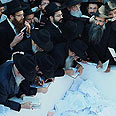
A judge in Washington on Wednesday ordered Russia to pay $50,000 a day in fines for failure to adhere to a 2010 ruling requiring it to return books and documents to the New York-based Chabad-Lubavitch group.
The ruling raised hackles in Russia at a time when relations are strained by differences over the conflict in Syria and by a law signed by President Vladimir Putin last month barring Americans from adopting Russian orphans.
Putin, who began a six-year third term as president last May, has frequently assailed the United States for what he sees as interference in the affairs of other countries, and accuses Washington of seeking to impose its will and laws abroad.
In a Foreign Ministry statement on Thursday, Russia called the initial ruling ordering the return of the texts "odious" and made clear it had no intention of paying fines.
"We have said more than once that this verdict is of an extraterritorial nature, contradicts international law and is legally void," it said of the 2010 ruling.
It dismissed the new ruling as "absolutely unlawful and provocative" and threatened harsh but unspecified retaliation if Russian property is seized by the United States in the dispute, though there was no immediate indication that would occur.
The Schneerson Collection texts are held in Russian state libraries and archives and have been the subject of a legal and diplomatic tug-of-war since before the 1991 Soviet collapse.
Some of them had been seized by Hitler's forces as they pushed eastward during World War II and then confiscated by the Soviet Union as it drove the Germans back.
"The American authorities, we hope, understand that if Russian state property not protected by diplomatic immunity is seized by the United States ... we will be forced to take tough measures in response," the Russian statement said.
The language was similar to that Russia used in threats last year to retaliate if the United States adopted a law to punish alleged Russian human rights violators by denying them US visas and seizing their assets in the United States.
President Barack Obama signed that law, known as the Magnitsky Act, in December. The Kremlin-controlled Russian parliament swiftly responded with a law imposing similar measures on Americans and banning adoptions.















